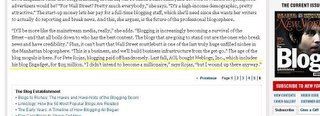Journalist plagiarizes self
All journalists love a good quote. So I can understand that Clive Thompson, in writing an article about the blog hierarchy that detailed--in the lede--the methodology of a social science analysis of the blogosphere based in network theory, got fairly hot and bothered over this quote:
“I didn’t intend to become a millionaire,” says Rojas, “but I wound up there anyway.”
The quote refers to a man who landed a windfall when AOL bought out the company hosting his blog for $25 million.
It's quite a kicker, and Thompson indeed used it to end his article. But the same quote, and the same allusion to the buyout, appeared on the third page. It also appears as a pull quote on the fourth page--odd, since online articles don't usually stick print-style pull quotes smack in the middle of the text.
Here are some screengrabs of the autoplagiarism:
Page 3:

The awkwardly-placed pull quote on page 4:

And the kicker on page 6:

The story is about how the blogosphere has organized itself into the same kind of A-, B-, and C-list hierarchy as mainstream media. Anyone who was on USENET in the early 1990s and saw--gasp--the first advertisements on the World Wide Web wouldn't be surprised at this.
Thompson breaks the hierarchy down thusly. There is a smattering of A-list blogs making total bank, and gazillions of C-list blogs chattering in obscurity, begging the A-list blogs for traffic. They beg because hits come from links, and as the rich blogs get richer and the poor blogs get poorer, no one ends up linking to the little guys.
Of course, Thompson sneaks in a sly, self-deprecating self-promotion (parenthetical, natch):
(This has even happened to me. I run a small science blog—avowedly C-list, a pure vanity project—and the times that Boing Boing or Gizmodo have linked to me, my traffic has exploded.)
At least he was tasteful enough to leave out the name of his blog. But I'm sure he wouldn't mind finding himself in the position of Dan Rojas. Last fall, AOL bought Weblogs, Inc., which includes Rojas's blog Engadget, for $25 million.
“I didn’t intend to become a millionaire,” says Rojas, “but I wound up there anyway.”
“I didn’t intend to become a millionaire,” says Rojas, “but I wound up there anyway.”
The quote refers to a man who landed a windfall when AOL bought out the company hosting his blog for $25 million.
It's quite a kicker, and Thompson indeed used it to end his article. But the same quote, and the same allusion to the buyout, appeared on the third page. It also appears as a pull quote on the fourth page--odd, since online articles don't usually stick print-style pull quotes smack in the middle of the text.
Here are some screengrabs of the autoplagiarism:
Page 3:

The awkwardly-placed pull quote on page 4:

And the kicker on page 6:

The story is about how the blogosphere has organized itself into the same kind of A-, B-, and C-list hierarchy as mainstream media. Anyone who was on USENET in the early 1990s and saw--gasp--the first advertisements on the World Wide Web wouldn't be surprised at this.
Thompson breaks the hierarchy down thusly. There is a smattering of A-list blogs making total bank, and gazillions of C-list blogs chattering in obscurity, begging the A-list blogs for traffic. They beg because hits come from links, and as the rich blogs get richer and the poor blogs get poorer, no one ends up linking to the little guys.
Of course, Thompson sneaks in a sly, self-deprecating self-promotion (parenthetical, natch):
(This has even happened to me. I run a small science blog—avowedly C-list, a pure vanity project—and the times that Boing Boing or Gizmodo have linked to me, my traffic has exploded.)
At least he was tasteful enough to leave out the name of his blog. But I'm sure he wouldn't mind finding himself in the position of Dan Rojas. Last fall, AOL bought Weblogs, Inc., which includes Rojas's blog Engadget, for $25 million.
“I didn’t intend to become a millionaire,” says Rojas, “but I wound up there anyway.”


0 Comments:
Post a Comment
<< Home